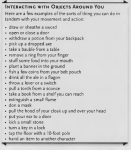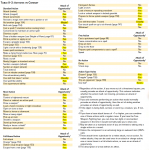CapnZapp
Legend
Thank you for your reasoned reply.You're talking about three things at once here: hand usage, hand freedom, and component tracking. Let's break 'em out.
Component tracking, except for those components that carry a monetary cost, is a pain. I've already conceded this, and noted the 3e idea of the 'components pouch' is a good compromise: if you've got your pouch you've got whatever minor components you need.
Hand usage mostly applies durign combat, and sometimes during exploration: tracking what is being carried in which hand. The rules have always said (quite rightly IMO) that - for example - sheathing a weapon and drawing another takes a certain amount of time, however that particular edition measures such (a segment, an action, whatever). What you seem to be proposing is to take away that time, which has the end result of having everything a character can carry in effect be in its hands at once, one thing per hand - whatever you need >poof< it's there. I can get behind a magic backpack having this ability, but beyond that it verges on ridiculous.
Hand freedom is another thing again, that only really matters to casters. Here the issue is whether casters can cast while bound or being jostled or attacked or are otherwise hampered in their movements. Below you state this hasn't mattered to most tables for thirty years; I'll give you twenty years instead, i.e. since the release of 3e and the corresponding gleeful player-side acceptance of its colossal blunder on this point. My point is that it should be made to matter again - you can't cast if you're restrained or under attack, barring a very few spells noted as exceptions. Once this is done, some spell nerfs can maybe come off.
A5e seems to want to go more complex, not less. Not sure how this fits.
Thanks for conceding the point on (material) component tracking. Unfortunately, that kicks in an open door, that is - that's not what I'm talking about; I'm simply assuming Level Up will never go back to that rigamarole, just like how many groups skip tracking of every other trivial expenditure, such as ammunition (note the part about trivial cost before you think I allow infinite Arrows of Slaying).
I am specifically arguing that 5th Edition should never have forced players to keep track of which hand goes where, and that Level Up has the opportunity to rectify this.
That does not mean that I want characters to be able to "carry everything at once".
It means that the core assumption should be that...
- a Fighter, Paladin or War Cleric might fight with sword and shield and thus has zero hands free
- a Fighter or Barbarian might fight with a greataxe and thus has zero hands free
- a Ranger or Rogue might fight with two daggers and thus has zero hands free
I use the phrase "weapons loadout" to mean a characters primary (secondary...) weapons configuration, but the general term is "loadout". Other loadouts include:
- making one hand free in order to retrieve a potion, and then drinking it (or administering it to a dying comrade)
- keeping both hands free (in order to swim, climb, etc)
...and, crucially, the system doesn't care about this handicapping them when it comes to opening doors, holding torches, drinking potions and the like. That is, no edition of D&D ever has taken these things into account. A Zorro-like Fighter isn't rewarded for keeping one hand free to a degree that comes even close to the DPS or AC lost by not picking up something (a second sword, a shield, ...) in that hand.
Furthermore, assume nothing of value is lost by skipping the subtleties involved in switching weapon loadouts; that the only reason for having detailed rules here is inertia, nostalgia and simply not giving the issue a long, hard look.
Just have a single action "switch loadouts"!
This action is to be used for every hand usage change. So instead of keeping track of what goes in which hands, simply let players describe loadouts:
- fighting with sword and shield
- fighting with bow and arrow
- climbing, swimming, ...
5E is far too friendly and simple (or at least, should have been!) to ask players to track the exact amount of actions and time involved when changing from loadout to loadout. Nobody cares about the way in Pathfinder 2 it takes longer for a character wielding two daggers to drink a potion (and get back to action) than a character with a greataxe (because releasing the grip is free, but sheathing a dagger isn't).
In particular, get rid of the cheesy "I drop my weapon, use my hands for something, then pick up the weapon from the ground" routine that 5E characters do use even in the middle of heated combat since a) dropping something is free and b) picking something up from the ground doesn't take longer than drawing it from your sheath.
Your argument, making spell components matter again, is on its own, fine. I'm afraid the genie is out of the bottle, however, and assuming Level Up won't go in your direction, my greater argument is: drop the finagly component rules entirely! That is, I'm not directly arguing against you. But you miss my point - as long as Level Up keeps the current level of complexity (or lower), get rid of using components to significantly modify spell usage.
This goes right back to my earlier discussion of loadouts.
Don't give a War Cleric spells that force her to mess around with hand usage! Assume she needs her hands on her mace and shield to do her job, and then give her tools that are compatible with doing that job!
There certainly can be exceptions, but then make them few and clear: write specifically in every spell given to a War Cleric "this spell requires you to first use the Switch Loadout action to gain a hand free".
This makes the action cost much much MUCH more up-front and clear. This makes the game much simpler (for those groups that haven't already skipped the rules anyway, their eyes glazing over when reading about object interaction...)
This also makes it clear when and where exceptions are needed.
For instance, I predict the Level Up designers will conclude that asking you to spend three actions just to drink a potion (switch loadout, use item, switch loadout) is far too expensive, and so I envision a special "Administer Potion" action:
Administer Potion: You draw a potion either from your own pockets or that of an adjacent ally. You then either drink it yourself or pour it in the mouth of an adjacent ally (unconscious or not). This action includes any hand interactions needed, which in game terms mean you don't need to perform any Switch Loadout actions before and after taking the action. In short, the action doesn't require you to have any hands free.
If it adds value, the game could even create a special category of actions that all waive any hand requirements. Besides "drink potion" I nominate "open door" for inclusion in such a category.
Having the two daggers fighter be considerably slower in running through a series of rooms with closed doors than the single-sword fighter just doesn't make sense in the context of 5th Edition. Differentiation on that level should be consigned to the dustbin of history, much like how we allow D&D crossbows to shoot every round or how D&D heroes never need to go to the bathroom or how D&D heroes bounce back at 100% capacity after being healed a single hit point from unconscious!
Thank you for reading,
Zapp




